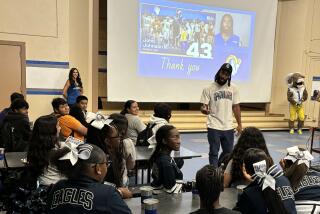Now, Life Is Hardly Super for Williamson
- Share via
NEW HAVEN, Conn. — To the neighborhood kids he is still “Super John,” and his jump shot is still deadly from 25 feet.
But life after professional basketball has been anything but super for John Williamson. It was even a misnomer while he was playing, he said.
“To be super, means you never get hurt, it means that you’re very strong, that you’re very physical,” Williamson said. “It meant having to prove myself. People really thought that I thought I was better than them and had a super ego, but there was no way I was thinking like that.
“It was a gimmick, everybody had a gimmick. . . . It became a burden to me. Professional people and coaches were saying, ‘Who the hell does he think he is, walking around with a nickname like that?’ ”
Williamson’s NBA career ended at age 30, cut short by contract squabbles and weight problems. With it went the 20-room luxury home and Mercedes Benz.
Now 34, Williamson, wife Bertha and four children live three blocks from the projects where he grew up with 10 brothers and sisters. A broken down car sits in the driveway.
“I was 30 years old when I left the pros. That’s very young to leave, especially for a person with the type of talent I possessed,” said Williamson, who works nights in a juvenile detention center. “I thought I was cut off from making ‘Super John’ a reality.”
It was in New Haven as a schoolboy star that Williamson was given the nickname “Super John” by a local sportswriter. There was also a “Super John Williamson Day,” held on the New Haven Green after he helped the New York Nets to the American Basketball Assn.’s final championship in 1976.
Williamson was awarded a key to the city by Mayor Frank Logue that June day, perhaps the high point of his career.
The next season, despite averaging 30 points per game, Williamson was traded to the Indiana Pacers where his ego clashed with Coach Slick Leonard. He walked out in the middle of a game in 1977 against the Portland Trail Blazers and a year later he was shipped back to the Nets. When the team held off on renegotiating his contract, Williamson let his 6-foot-2 body balloon to 225 pounds.
“Maybe I was crying too much about renegotiating my contract and they wanted me to be as unproductive as possible to take away my leverage. When they sent me to the fat farm I needed 17 points to become the No. 1 scorer in New Jersey Nets history over Dr. J,” he said. “It took me damn near eight games to get those points. Why? Because they didn’t want me to play and get those points so I could use it to negotiate. You run into a lot of politics.”
(He is sixth on the Nets’ all-time scoring list, ahead of Julius Erving, with 7,202 regular-season points.)
Branded an overweight malcontent, Williamson was picked up by the Washington Bullets for a stretch drive. The next season, however, he was placed on waivers and the phone didn’t ring.
That’s when life, and his lifestyle, started to change.
“I wouldn’t say I was rich. In material stuff I was rich. The most money I made in my professional career was $185,000 and a lot of that was in deferred payments,” he said.
“I’d say I had some bad advice. . . . I bought a tax shelter in the 1970s and in 1981 the government told me it was no good. Five years go past and the government comes along and says, ‘We’re not allowing that, so automatically you owe us $75,000.’ How could I afford paying this when I had no liquid cash? I had to sell everything.”
Williamson returned to New Haven, without a team, without money. He hoped that the city hadn’t changed the locks, that his ceremonial key would still work.
“You have to go back to your own town, where your family is from, where people have known you all your life. You can trust them to look out for you,” he said.
Aside from his work with juveniles, Williamson devotes time to a charity that tries to make dreams come true for dying children and to his son, John Maurice, who he claims is a better basketball player than he was.
The 16-year-old is a hotshot guard for Wilbur Cross High School, where his dad played and averaged 38.8 points per game in 1970.
While his son is learning a jump shot, he’s also hitting the books. Williamson said he’d never allow his son to declare early eligibility in college, as he did at New Mexico State in 1973.
“Being underprivileged, coming from the ghetto and poverty and becoming successful and getting money can cause problems for you if you don’t have an education and good people backing you,” he said.
More to Read
Go beyond the scoreboard
Get the latest on L.A.'s teams in the daily Sports Report newsletter.
You may occasionally receive promotional content from the Los Angeles Times.










